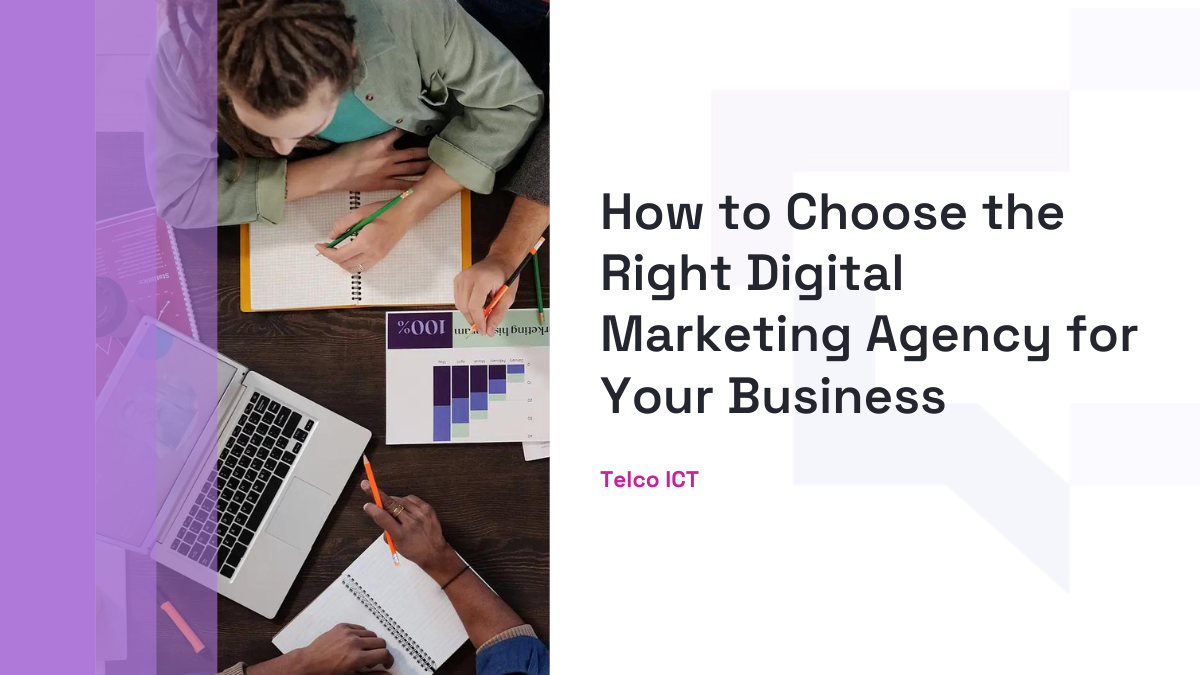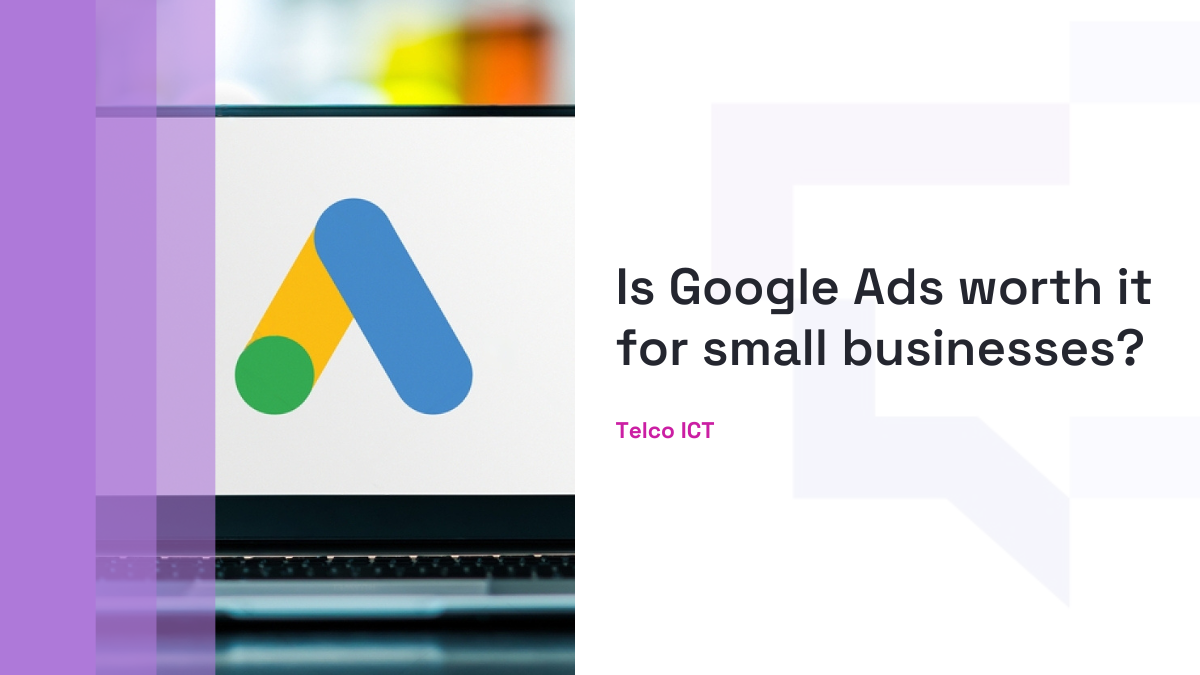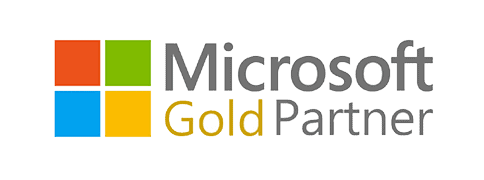All Posts / Local SEO: What Is Local SEO and How to Improve Your Local Ranking
Digital Strategy
Local SEO: What Is Local SEO and How to Improve Your Local Ranking

What is Local SEO? How important is it for local ranking? Why is it the most powerful SEO tool for small businesses?
Local SEO is a type of search engine optimization (SEO) that increases the visibility of your company in Google’s local search results.
You may be familiar with searches like “Managed IT services in Melbourne”, or “IT Support Melbourne”, or maybe the most searched phrase like “Restaurants near me”
Did you know that Google searches for local information like the ones listed above account for 46% of all searches?
This is why if your business is not optimized for local search, you risk missing out on local clients who are ready to shop or engage with your business. It actually gets worse for you because 88% of consumers that search for local businesses are likely to visit or call the business within 24 hours.
In short, if you want your company to remain relevant, local SEO is the way to go!
So how does Google use Local SEO to rank your business?
In this article, we will look at how you better rank with Local SEO and the best strategy to implement it. But first, let’s look at how Google works.
What Happens When You Type a Phrase into Google?
In most cases, the entire process between you typing a phrase into Google and getting results typically takes less than a tenth of a second. It’s just like blinking! But what happens when and after typing?
As you type, google anticipates your query. Most of the time, if your search is quite common, a list of similar queries may pop up. Like below:
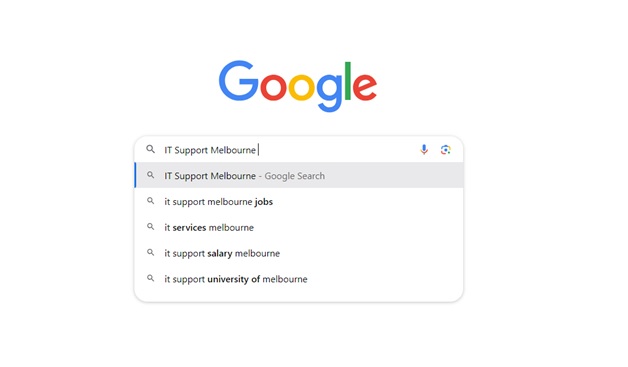
Google then searches through billions of web pages, ranks the pages together with any material available, and then gives you the best among the available.
As straightforward as it may seem, there’s still more to it.
Most people are unaware that when they type something into Google’s search bar, it doesn’t immediately perform a live search of the entire internet. Actually, it’s searching for a cached duplicate of every site that Google has found. This replica is better known as the Google Index.
Google uses tiny applications known as “spiders” to crawl the web and compile the index. Every spider operates in the same manner: it begins on a single page, follows the links on that page, then scans the information on subsequent pages, and so forth.
Google’s servers retain online content as it is crawled, building an index as they go. The sheer scope of the spiders’ work is remarkable; they rapidly and continually crawl trillions of pages. This keeps the index as up-to-date as possible and makes it easy to find new websites and links.
So let’s say the “spiders” have found your site, how then does it rank in comparison with other sites that were found?
How Google Ranks its Search Results.
Google does not randomly suggest or rank a page, there’s an algorithmic way of ranking each page in its index.
With every page Google finds, it holds an opinion of its authority and usefulness to you as a user, concerning your search query.
It then uses an algorithm with over 200 known variables or factors to order the results on a search result page. These factors are grouped into 9 subgroups which include:
- Page-Level Factors
- Brand Signals
- Domain Factors
- Site-Level Factors
- User Interactions
- On-site Webspam Factors
- Off-Site Webspam Factors
- Special Google Algorithm Rules
- Backlink Factors
To determine whether websites offer material relevant to your search, the algorithm looks at a variety of both on- and off-site factors.
All relevant websites are added to the list, and it is then extended and sorted by importance. Again using the numerous on-site and off-site parameters, the algorithm determines which websites best match your search query, and those websites are displayed at the top of the search results.
As a result, if you show up higher in the search result pages for a certain search query, Google will consider you to be the most authoritative and relevant result.
Please note that since every search query is made up of keywords and phrases, each search result page answers specific search queries.
Google’s AI is built in such a way that it understands the meaning of every query. This enables it to process each keyword as a concept rather than just independent words. Its algorithm is called Natural Language Processing. This is because it works like how humans understand and process language.
Now what?
Now, many of the elements that impact your Google engine positions are things that we are aware of and comprehend. Some of them are still a mystery, though. This is due to the fact that some ranking variables are also developed and modified by Google’s AI algorithms.
Comprehending Google’s thought process may appear to be quite a tack. But don’t worry; there are several obvious and surefire steps you can take to raise your search rank.
Note that your site will rank higher in more search results if the necessary digital footprint components are optimized. This is because increasing your SEO has an impact on the relevancy, prominence, and link popularity of your website..
This is why you need Local SEO.
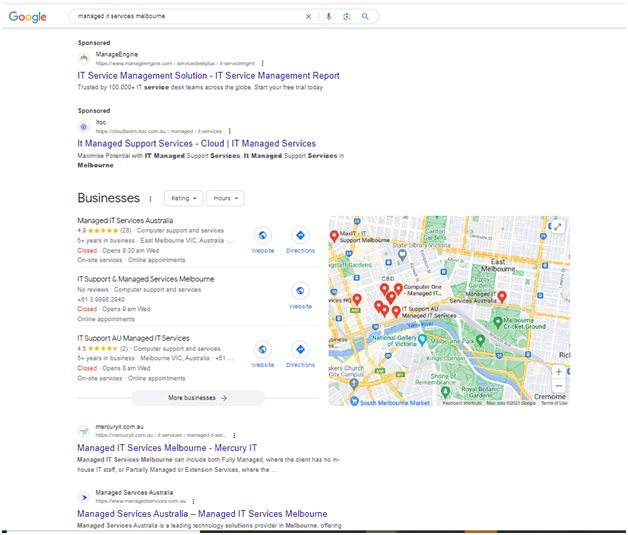
How does Local SEO work?
Local SEO is beneficial for any company that has a physical location or serves a specific region. Typically, at least once a week, 78% of local consumers search for information about a local business online. This is why you want to make sure that such kind of traffic finds your business whenever they search on Google. Local search engine optimization (SEO) is what you need to do.
When you mention the name of a city in your search query, for instance, “IT supports Melbourne”, the search engine gives you results based on the area of Melbourne.
Alternatively, if you search just “IT support near me”, the search engine deduces a location from your device and then it gets you results based on your location.
When you hit ENTER, you’ll see three major areas below:
1. The Google Ads or the Target ads to Geographic Locations
When you type a phrase like “IT support Melbourne”, you typically get something like:
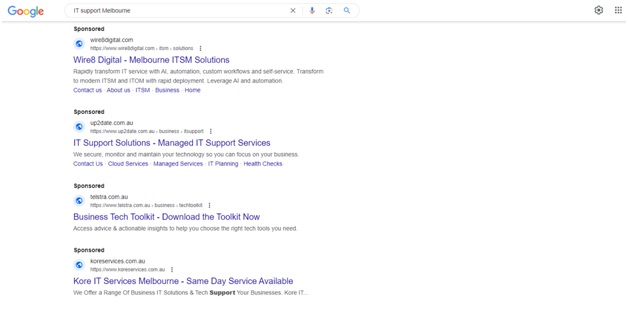
When customers search for relevant terms, companies can advertise and promote their goods and services using Google Ads. It has the potential to accelerate leads and sales when done correctly.
Those that appear on the first page or higher of the search results typically receive a significant number of clicks compared to those that appear on other search results pages.
This is since every time a pertinent search is conducted, this part receives 15–20% of clicks.
If a map with three entries appears beneath it when you search Google for any relevant terms for your firm, that can help you grow your business.
2. The Google Map Results or the Google Map Pack
With all the intelligence Google possesses, it was only a matter of time before Google discovered that many people make searches relevant to a particular location.

When a user searches on Google for any relevant keywords for your company, a map with three entries displays just below the Google ads. Based on relevance, popularity, and distance, Google believes that these three businesses best match the searcher’s needs. This is known as the Google Map Pack.
The significance of the Google Map Pack cannot be overstated given the recent explosion in local “near me” searches. It garners 30-50% of overall clicks, which are shared among those businesses. This is why your business needs to rank in this section.
3. The Organic Search Section
This is where the rest of the search results are listed. There are usually 10 results of a business that majorly depend on organic SEO.
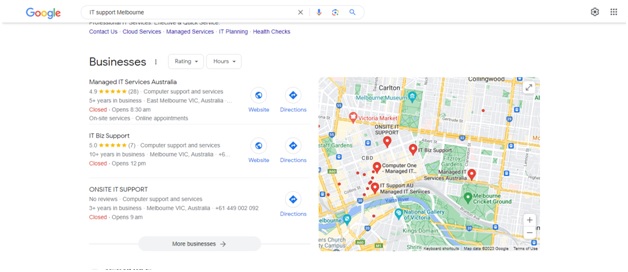
This section usually gets the remaining 20% of the total clicks, which are shared among the ten businesses.
Implementing Local SEO: How to get it Right.
A heavyweight war is going on for the top ranks in Google’s search results. This reality may particularly be too much for small businesses. Fortunately, Google is aware of this discrepancy in search contexts and has given local businesses a platform to be heard.
You need a plan for focusing on localized searches and users in your area whether you operate a physical site or an online business that caters to a particular locale. This is how you can dominate your competition, rank higher in Google searches, and draw in more clients.
This guide will show you how to develop a local SEO plan for any business to increase your online visibility.
1. Take High-Quality Photos
Assuming that your business’s website is up and running, the first step is to take a high-quality 360 degrees photo of the interior and exterior of your business.
You can do this by hiring a Google-verified photographer to do this for you. Next, you need to have the photographer upload the photos into the map listings. When you use a google verified photographer to take and upload the photos, the following 2 things happen:
- The photo shows the address at which the photo was taken, which is your official address.
- If the photographer is a trusted professional, that itself is a ranking factor.
These 360 degrees photos, with the help of a trusted Google photographer, can skyrocket your business 2-3X.
In the scenario that you are operating from your home, but you have the intention of serving people from a certain locality, the same strategy will also work for you. Have the photographer take a photo of your home office space, the outside, and let them upload it. The effect will be the same as for those operating from a commercial office space.
2. Make Use of the Google My Business APP.
This app is one of the best resources that Google has put out here, and you can use it to improve your local SEO.
What you need to do is download the GMB App on your phone and use it to take photos of the interior and exterior of your business premises.
Note that you specifically need to take the photos using the app itself and not your normal camera app. This is important because the photos will have unique coordinates that allow Google to know that your photos were taken in that particular location. Therefore, you need to fill your profile with longitudinal and latitudinal photos of your offices, staff, the exterior, your parking lot, and a street view. This will further inform Google that your business is actually verified, trusted and legit.
3. Optimize your Review Locations
It’s good to have many reviews. However, you don’t need to have reviews all from the same area. Consider having your customers make their reviews from all over the place, within the region that you intend to cover.
A major tip for this is to not let your customers make their reviews while still on your premises. Why? If your customers are from your location, google will think that your business is only relevant in that particular location. This will only derail your ranking rather than boost it.
What you can do to salvage the situation is to let your customers go to their respective premises, which can either be within or outside the region of interest. Next, you need to send them an email, politely asking for a review of the experience with your products or services.
As you might have guessed, this will tell Google that your business is relevant in all of those locations from which the review came. This will in turn signal to Google that your business is relevant in that whole region.
4. Learn how to filter your Reviews.
No matter how good your business is, there are always one or two customers that will never be satisfied with the experience you offer. Consequently, since you need as many reviews as possible, sending mass requests for reviews comes with the risk of having a negative review permanently attached to your Google listing.
Lucky for you, we have a solution for you.
One way that has proven to work time and time again is the use of a conditional logic form that prefilters all the incoming reviews. This is how it happens:
-
- Send your customer an email requesting a review.
- When the customer decides to leave a review, you send them to the conditional logic form page, instead of the Google page. You can have something like:
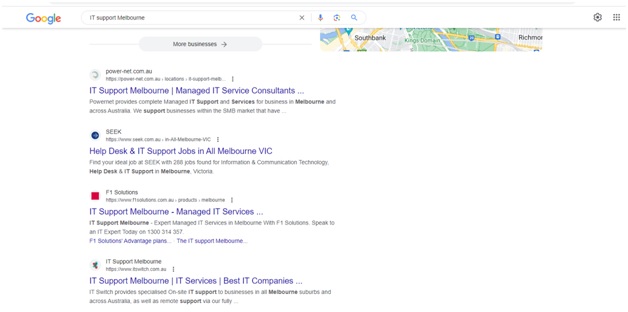
-
- If the customer leaves a positive review, on hitting the submit button you redirect them to your Google My Business page and ask them for a 5-star review.
- On the other hand, if a customer leaves a negative review, you redirect them to the page where they can leave their feedback. This form is then submitted to you instead of going straight to your GMB.
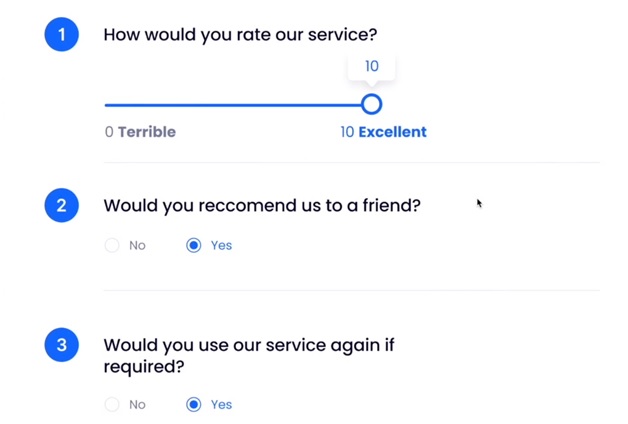
- This gives you the liberty to deal with these negative reviews internally, without having to compromise your Google ranking.
5. Reply to reviews
In whatever you do, Google needs to see that you actually care about your customers, and their opinion matters to your business. There is no better way to show this than through replying to reviews.
If a review makes it to your GMB page, make sure you reply to it. Make sure you reply to all reviews to make them count on your profile. This gives you the upper hand also because it signals to Google that you are engaging your customer and that you actually care about their experience.
6. Deal with Cheaters
If you are a regular Google user, you have obviously seen something like this:
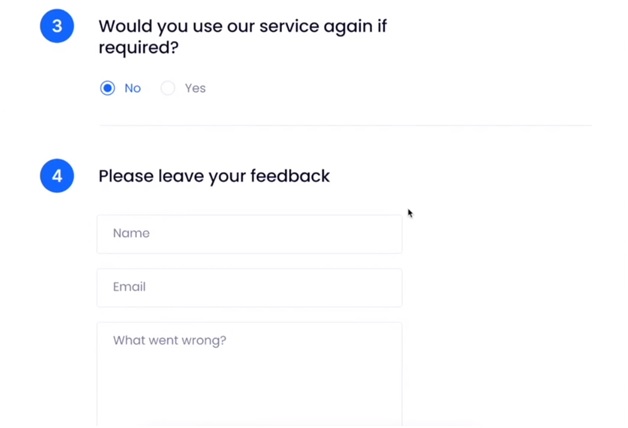
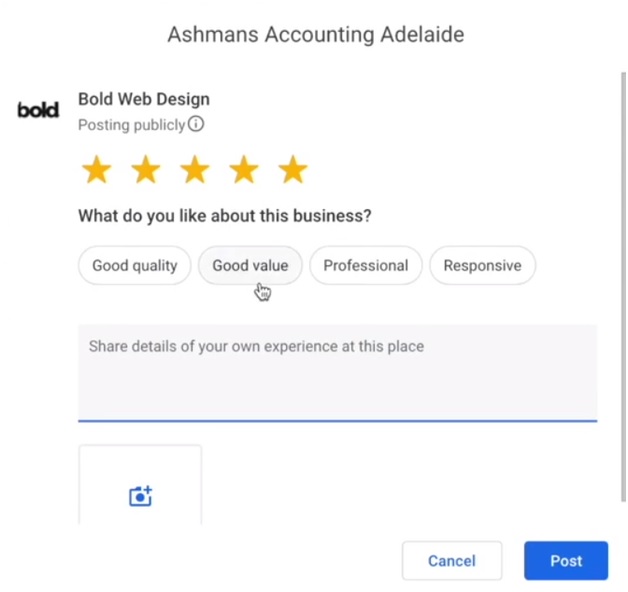
These are the cheaters we are talking about.
Some businesses have decided to use their keyword( which is mostly the service that they are offering) as their business name. From the result above, notice that all of the 3 businesses ranking on the Map Pack are all using the keywords I searched as their business name. It’s actually not surprising that all of the 3 businesses are cheating, because this is currently, many businesses have resulted in this means to rank.
The truth is that if you are tempted to do this for your business, Google will either ban your business or edit it to the right format. Either way, this sends a negative signal to Google.
The solution to this is to help google to derank such businesses. Brutal, right? But here’s the thing, you need to understand that this is business and you have to fight for your place at the table.
So how can you help Google derank the cheaters?
-
- Type in the service that you offer and the location. Let’s say “Electrician Melbourne”. You’ll definitely see businesses that are using these keywords and their business name as shown below:
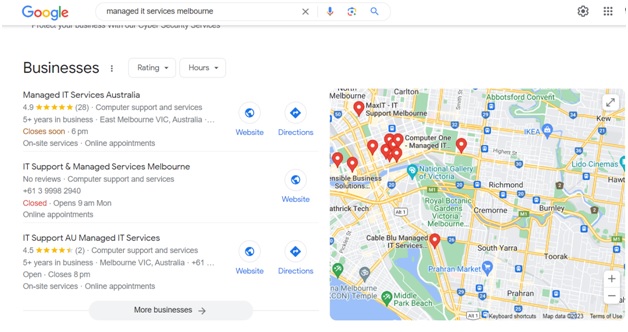
-
- Next, Click on one of them, and then click on suggest an edit and you can type in the actual name, then leave it to Google to do the rest.
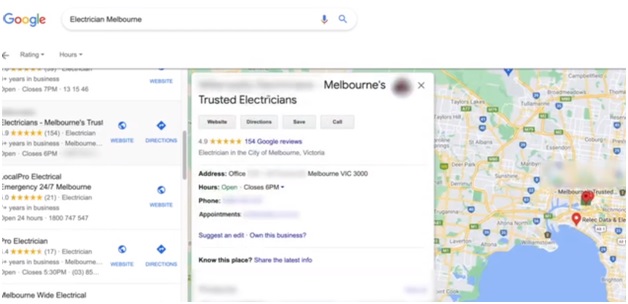
-
- Within a few days, Google will look at the suggestion then edit it as suggested and finally derank the business.
Please note that this will not affect their business in any way other than ranking them lower and you higher because when your competitors go down, you automatically rank.
7. Have an Accurate NAP
NAP stands for your Name, Address, and Phone Number. You could do every other thing to rank your business, but if the NAP is inconsistent, your site will still struggle.
This strategy requires you to have your NAP accurately listed across your entire website. This includes making sure that names are Identical throughout, be it the cases, the punctuations, spacing, spelling, and everything else.
The NAP on your Google listing must also be exactly the same as that on your website. If Google discovers any inconsistency in the NAP, it will struggle to rank your page and the result of this is basically lower ranking.
To check if your NAP is accurate, you can use websites like BrightLocal. It works as shown below:
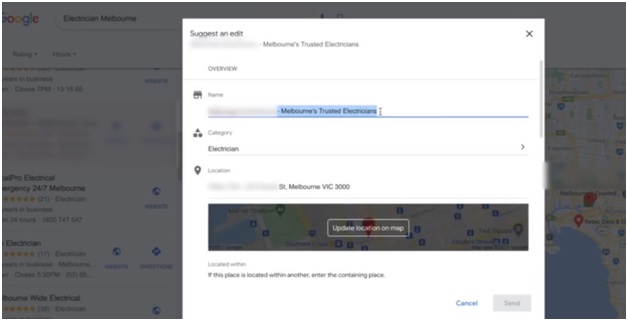
Just type in your business name and address and run a search. It will show you all inaccurate searches and fix them.
8. Take Advantage of Press Releases
One of the best marketing weapons at an organization’s disposal is media publicity.
What you should do is show Google that there are very many websites that are referencing your site, giving Google the impression that your business is an authority in your niche.
Media coverage can assist in spreading the word and reaching target audiences, whether it be to market a new good or service, bringing attention to a cause, or conveying significant company news.
But how does your business secure media attention? The use of a press release is one popular and efficient strategy.
A press release is a formal notification issued by a company to the media and other interested parties about its most recent business development to generate press coverage.
Using a press release to a popular media publication or media entity in your region will get you many backlinks from people who are looking for your services. Even in these press releases, ensure to include an accurate NAP, because it will count as a Citation to your website.
9. Leverage Bing Places for Business
Did you know that Microsoft has a similar feature to Google Map Pack called Bing Places for Business?
Just like how you submit your listing to Google, you can also submit your profile to Bing places and it is going to have the same effect on Google. You can do this in just a few steps:
- Just Get Started:On Bing Places for Business, click on Get Started as shown below:
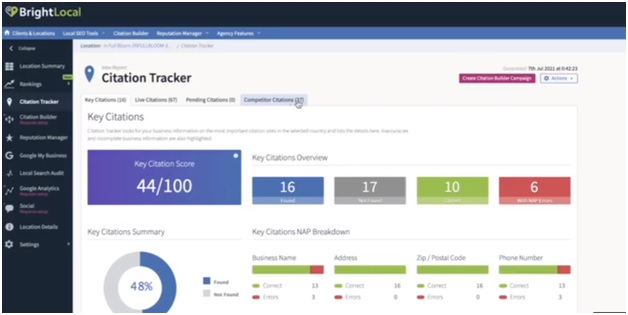
- Fill in Your Business Details:

You should then be taken to a page with the following form.Fill out the “Phone number” area with your company’s phone number. You might also enter the name of your company or profession and the location of your place of business. Once you have finished entering, click the Search button.
- Next, claim your businessYour company listing should appear in the search results.
In the box next to your company name, click the green Claim Business link.
If you haven’t logged into your Microsoft account yet, you will then be taken to a login screen. Log into your account, then navigate to the next page.
Clicking the green Create new business button will allow you to add your company to Bing if there are no results.
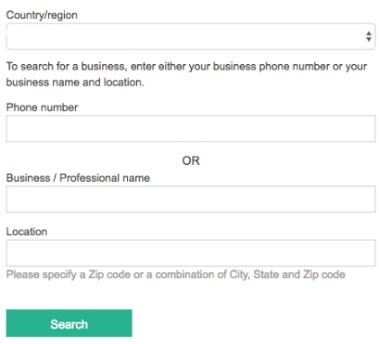
- Take the time to check and verify your Business Info:
You will then see a box where you may enter your business information. The majority of the information ought to be filled in already, but double-check to make sure.
To proceed to the following section, click Next. Once you are pleased with the data shown, click Submit.
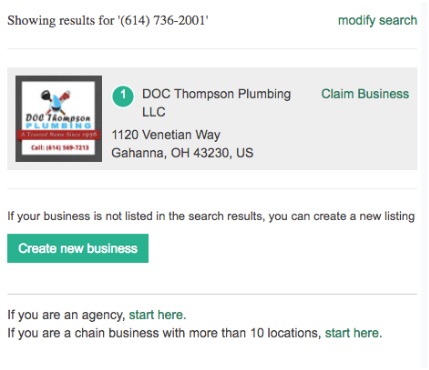
You will now be given the recommended methods of confirming that you actually own the company you are claiming to own.
- To get your Verification code, choose one of these methods.You will receive a notification from Bing Places after your business has been verified, confirming that you have successfully claimed or added your business to Bing.
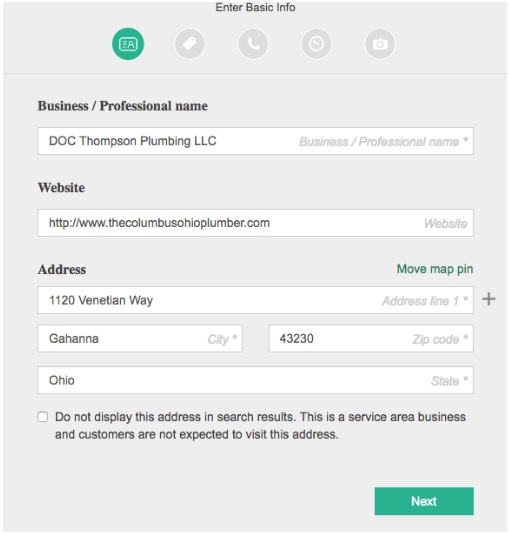
Although Microsoft is a major Google competitor, being listed as a trusted source is still a huge advantage for your business.
10. Event platforms
Events are another way of solidifying your authority in your target region. This is because big brands hosts events from time to time, and it has helped them stay on the lead.
Start with submitting your site to event platforms like meetup.com. This must not be necessarily have many attendees, but if you can get a multitude to come, especially using google directions, the better for you.
Hosting such events tells google that your business is big trusted brand that people see as important and worth associating with. Additionally, hosting such events at your office space helps boost your local SEO.
11. Map Application
Have you ever heard of an application called WAZE? If not, this is your chance to look it up because it one of you best chances at getting your business rank in you target region.
Waze is a Google-owned app that calculates the best route to a user’s location based on real-time data from the app’s users, taking into account traffic congestion, construction zones, speed traps, accidents, and other potential roadblocks. It was developed by an Israeli firm and later purchased by google in 2013.
On Waze, users keep a list of their pals on the app so they may keep track of one another while traveling or find a friend nearby. They can share updates proactively using the app as well as automatically while they drive. It can also give you insights when driving, for instance a better route to use when there is traffic.
Waze is free to download and, like Google Maps, makes money via advertisements displayed on the maps.
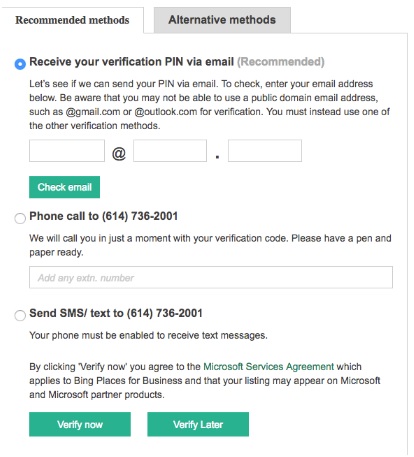
With Waze, you need to take a photo of your premises the walk by the premises to get you listing approved. Once approved, it shows google that your website is not a spam website and that it has an actual business location and address. This is another way to skyrocket your google ranking.
12. Youtube Citations
You probably know that content marketing is one of the best way to get your business out there. Especially video content marketing.
Youtube is so far the biggest Google-owned video platform and if your business is not already creating content on there, then you are missing the point.
Use youtube to get your NAP out there. Instead of just putting links to variuos resources, include your Name Address and Phone number, the way it is on your Google listing.
Since Youtube is owned by Google, having your NAP published on there multiple times continues to tell Google that your business is legit and is trusted by people.
13. Google Indexing
To simply put it, Google index is a database of websites that google uses to give users search results. Despite the impression that Google is big enough to lead you to any website on the Internet, this is untrue. Search results can contain just indexed websites. Therefore, Google indexing is adding websites to the Google index. So how can you leverage this for your local ranking?
You need to create a page on your website and on that page, put links to all your profiles that you have published anywhere on the internet. You could include your YouTube profile, social media platforms, Google listings and any other available citation.
Next, go to the footer of your website and link the “inventory” page that you created above to give it some sort of authority.
This helps Google index your website if it was de-indexed, because this happens sometimes. Submitting a profile does not necessarily mean that Google has indexed it. Therefore, linking the profile to your website gives your business some credibility and increases your chances of being indexed.
14. Utilize the Many Job Listing sites Available
Every time you are hiring, take that as an opportunity to publish your NAP on other websites. Get each job listing to be linked to your GMB page.
What’s the trick behind this strategy?
Job boards are one of the most visited websites and Google knows and trusts these sites. Getting your NAP published on there tells Google that your business is truly a real business that people trust. When many real users keep clicking the link to your profile, Google registers that your business is actually relevant.
15. Leverage the Google Directions
If you know of any customers coming to your offices, you should always send them your directions link. This will go a long way in improving your local ranking, and we’ll tell you how.
Having people use the directions to come to your location, Google knows many people are interested in your business and they actually visit you from time to time.
If your business gets more visitors than your competitors through Google directions, it sends a signal that your business is superior and authoritative, hence better ranking.
It’s Time to Start Harnessing the Power of Local SEO
Up to this point, we believe that you have gotten a better understanding of why you need Local SEO. Therefore, you can now start focusing on signals that will improve your site’s digital presence in the local oriented search ecosystem.
If you felt disadvantaged because you thought Google had a bias against your business despite having a strong organic SEO, then maybe Local SEO is the way to go.
By doing this, your company will appear higher on the results page, increasing the likelihood that more potential customers will find it.
Frequently Asked Questions
1. What is the difference between traditional SEO and Local SEO?
Ans: The major difference between traditional SEO and local SEO is that traditional SEO aims to improve a website’s visibility on search engine results pages (SERPs) for a broader and often global or national audience. The goal is to attract organic traffic from various locations and reach a wide range of users.
On the other hand, Local SEO concentrates on optimizing a website to appear prominently in local search results. It is primarily concerned with targeting a geographically specific audience, usually within a city, region, or specific locality. The intent is to attract nearby customers looking for products or services in a particular area.
2. How can a business rank for a keyword across the map grind when they are only in one location?
Ans: Ranking for a keyword across a broader area like “across the map grind” when a business is only in one location can be challenging, as the keyword implies a wider geographic scope than the business serves. However, there are some strategies that the business can implement to improve its overall visibility and potentially rank better for such a keyword:
Optimize for Long-Tail Keywords: Instead of trying to rank for generic and competitive keywords like “across the map grind,” focus on long-tail keywords that are more specific to your business and location.
Localize Content: Create content that emphasizes the business’s expertise, services, and connection to the local area. Incorporate local keywords, landmarks, and other location-specific references in your website content, blog posts, and meta tags.
Google My Business (GMB) Optimization: Optimize your Google My Business listing to its fullest extent. Provide accurate and detailed information about your business, including the address, phone number, business hours, and categories.
3. Does a business with multiple locations need different websites for each location to rank in the Map Pack?
Ans: No. You only need separate location pages on your website that link to your GMB listing.
4. Does this Local SEO strategy work for an e-commerce website with no physical location?
Ans: Unfortunately No. For this strategy to work, you need to have physical premises.
5. Where is Google heading in the next 5 years?
Ans: In as much as there is no precise answer, there is only one that we know: Google is always concerned with what works for the users. This means that Google shifts in the direction in which the user;s needs are shifting. Therefore, for your business to stay relevant on Google, your website needs to give the users the best experience. This could be fast response time, answers to what they are looking for, easy to navigate. You need to do what’s best for your users because this is where Google is headed.
Conclusion
Local search is expanding faster than ever.
It’s crucial to remain ahead of the changes as well as to keep up with them. Staying ahead of trends and developments is stressed since doing so is essential to preserving stability and solidifying your position. There is no better time to do this than now!
If still struggling, you can either do further research on your own or enlist the aid of an SEO specialist to assist you in predicting search engine trends. Whatever the situation, the main goal is to be seen by as many people in a specific location as you can. The fastest way to reach this objective and expand more quickly is to improve every local part of your website.
Table of contents
Related Posts
We’ll handle the tech
so you can get on with
running your business.

CALL US
1300 414 214
Our Trusted Partners
Contact Us
Let’s Talk
Common Questions
Do you outsource your work overseas?
No. We use local teams only. That way we can respond more quickly to any problems that may occur. We want your tech running smoothly so you can focus on what you do best.
Is your support 24 hours?
Yes. We have people available whenever you need us. We understand that your tech runs 24 hours, and you need it be working at all times.
Are your services customised for my business?
Yes. There is great off the shelf software. But we know one size never fits all. So anything we set up for you is designed to make your business run smoother and in the way you want it to.
Are your services expensive?
No. Reliable tech is the life blood of your business. We keep it running smoothly so your business can keep making money. All our services are fixed fees, so you never get any nasty surprises.
What’s the next step?
Simply book a chat with one of our experts. We’ll have a chat about exactly what you need and how we can help. If you like our approach then we’ll give you a fixed price quote and get everything up and running for you, fast!



